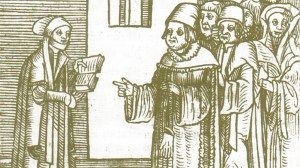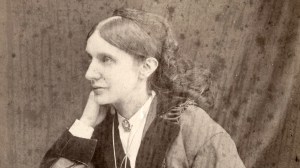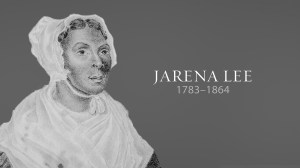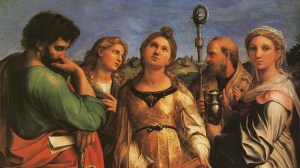In this series

It is a curious fact that women were prominent in the life and literature of fringe groups [of the early church]. The Naasenes claimed to have received their teachings from James, the brother of Jesus, mediated by a woman named Marianne. Epiphanius said that the Nicolaitans had a work they ascribed to a woman they thought was Noah’s wife, called Noria.
The Apocryphal literature names not only Thecla, in the Acts of Paul and Thecla, but also Marianne, alleged to have been the sister of Philip, and a number of other women who were said to be prophetesses. The New Testament itself had spoken scathingly of “that woman Jezebel, who calls herself a prophetess” (Revelation2:20). But does this mean that only deviant sects had prophetesses, or, conversely, that prophetesses were always heretical?
The answer is clearly negative, since the canonical Book of Acts mentions that Philip the evangelist had four daughters who prophesied (Acts 21:9). Why then were prophetesses apparently more active in heretical groups than in the orthodox stream of the church?
One can only speculate, but the following facts may have a bearing on the question. In order for the deviant groups to gain adherents, it was necessary for them to demonstrate their superiority over the established church. This was done, in part, by claiming truth the orthodox Christians did not possess or emphasize.
Such “truth” had to come from a divine source, and the expected mode would be prophecy. By their nature, these groups were individualistic and lacked the established church’s corporate structure (such as it was by that time). The way was open for individual prophetic activity, which in these groups included the participation of women. It could also be suggested that because women were increasingly restricted in the developing church structure, some of the more strong-minded or impulsive ones would gravitate to groups that allowed them more expression.
Gnosticism
Whatever the case may have been with the other sects, in Gnosticism the female presence was prominent in its very theology. While the question could be asked as to why their theology became so feminized, for purposes of the present survey it is more important to observe that the existence of a feminine principle at the heart of their system could hardly fail to raise the female consciousness in their society. Much research has been done in this area, especially by Elaine Pagels [in her book The Gnostic Gospels (Random, 1979)]. In a chapter entitled “God the Father/God the Mother,” Pagels assembles a curious assortment of texts. They are not monolithic, but evidence a diversity of attitudes toward sexual differentiation. One of these reveals an assumption that for women to enter the kingdom of heaven they must, as Pagels puts it, “assimilate themselves to men”:
“Simon Peter said to [the disciples]: ‘Let Mary leave us, for women are not worthy of Life.’ Jesus said, ‘I myself shall lead her, in order to make her male, so that she too may become a living spirit, resembling you males. For every woman who will make herself male will enter the kingdom of heaven.’ “
… At the heart of all this is the theological discussion among the Gnostics themselves, according to Irenaeus, as to the feminine element in Bythus, who was generally thought to be the supreme being among the Gnostic hierarchy. Some considered “him” to be sexless, while others thought he was both masculine and feminine, “assigning to him the nature of a hermaphrodite” (Against Heresies, I,XI, 5).
The feminine principle in Gnostic thought was expressed frequently and under a variety of names, including “Mother,” “Sound,” “Thought of the Father,” “Image of the Invisible Spirit,” “Perfect Mind,” “First and Last,” “Thunder,” “Whore,” “Mother of All,” “Virginal Berbelon,” and the “Ineffable Mother who presides over heaven.”
How does this complex of Gnostic ideology—of which only a part is reproduced here—fit into the whole picture of women in the early church? It has become increasingly common for students of the religious literature and history of the early Christian centuries (including the New Testament itself) to view this from a social perspective. Commenting on the Gnostic views and the diversity within the Christian church (e.g., Paul’s teachings in comparison with the prominence of prophetesses in Montanism), Pagels remarks:
“Such contradictory attitudes toward women reflect a time of social transition, as well as a diversity of cultural influences. … In Greece and Asia Minor, women participated with men in religious cults. … In Egypt women had attained … a relatively advanced state of emancipation. … In Rome, forms of education had changed … [women were active publicly in business and social activities]. … “
“Yet despite all of this, and despite the previous public activity of Christian women, the majority of Christian churches in the 2nd century, like the majority of the middle class, opposed the move toward equality.”
Montanism
In contrast to some of the heretical sects that developed a competing system of theology over against orthodoxy, Montanism was flourishing as an attempt to bring in a new spiritual and visionary order emphasizing the Second Coming; this order was established to counter the formalism of the church.
Along with Montanus himself were two prophetesses, Maximilla and Priscilla. They were accused of leaving their husbands to follow Montanus. These prophetesses announced the imminent return of Christ and the advent of the New Jerusalem.
Maximilla declared, “After me, there will be no prophetess anymore, but the end will come.”
Montanism itself was condemned by the church, but the extant pronouncements of the Montanist prophetesses, though they are somewhat mystical, do not contain outright denials of basic doctrine. These women spoke in the name of God, but did not claim to be divine themselves. On the contrary, they sought to call the church to Christ and to an expectation of His return.
Opinions have differed on whether their adherence to a deviant sect invalidated their belief that God had called them to prophesy. But throughout the centuries there have been women who were willing, even under criticism, to commit themselves to ministries they thought—rightly or wrongly—were the call of God. Some, suffering not merely criticism but also persecution, even committed themselves to martyrdom …
Understanding the Conflict
There are at least three ways to view the conflict between the orthodox and the sectarian practices regarding women. One is that the orthodox biblical position forbade the public ministry of women, with much of the prophetic and other leadership activity of women being thought of as simply out of order.
Another view is that the more orthodox churches were in reality opposing the activity of women in the heretical sects such as Gnosticism and Montanism largely because they opposed the sects themselves.
A third view is that in keeping with the social movements of the day, as Pagels says, perhaps Christianity moved upward in the social scale, from lower-class status, in which women had been needed in ministry … , to the middle-class, where women were still restricted in that society. In this last view, we should also note that Christianity was not completely at home in the upper classes in which, certainly in Roman as well as in other societies, women had long since gained status and freedom. Perhaps all three of these views are in some decree valid.
Copyright © 1988 by the author or Christianity Today/Christian History magazine. Click here for reprint information on Christian History.















